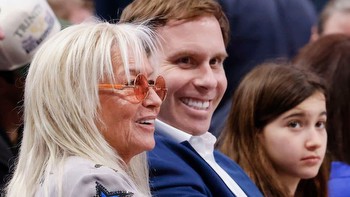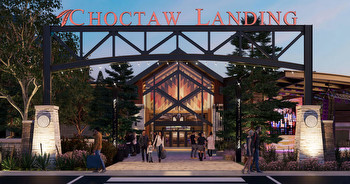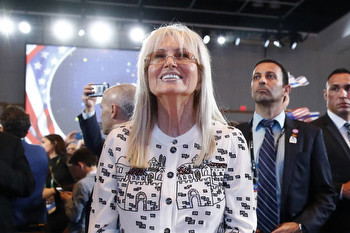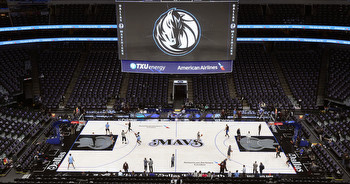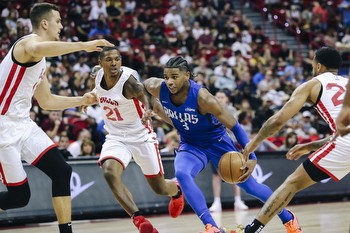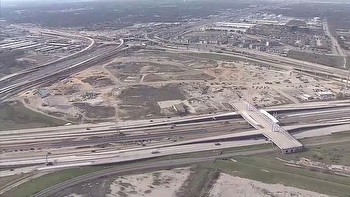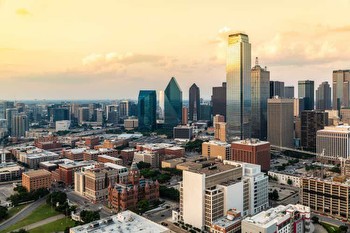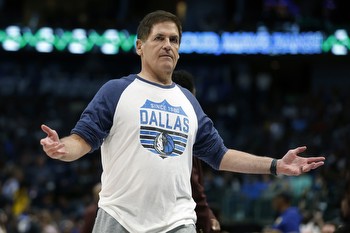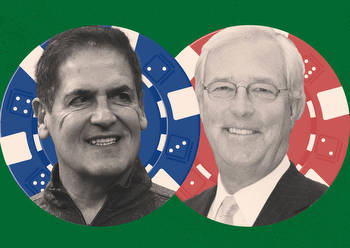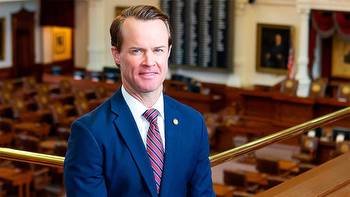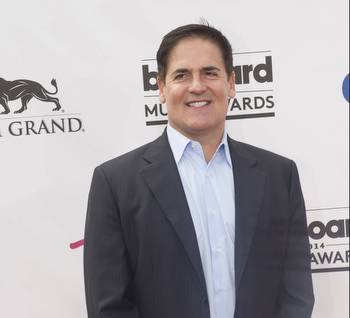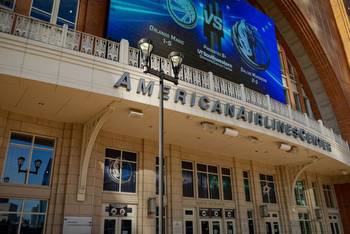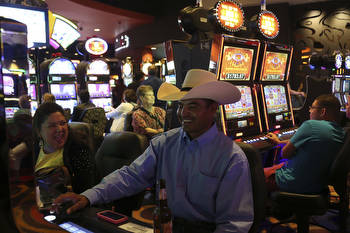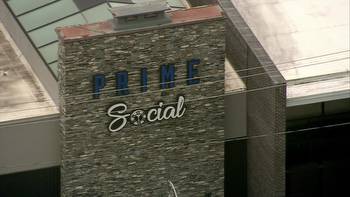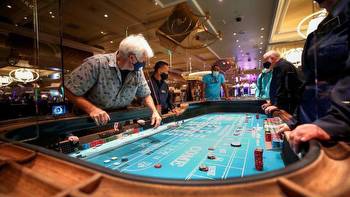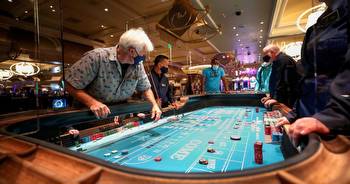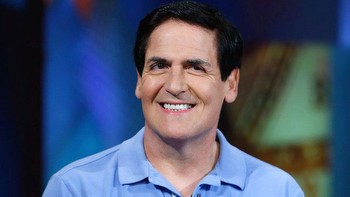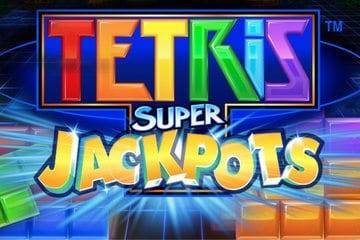Mark Cuban has Vegas-like vision for Dallas, new Mavs arena if Texas OKs casino gambling

DALLAS — In recent years, Mark Cuban’s vision for a new arena has included a 20-story Madison Square Garden-like structure with window views of Dallas and fans arriving in autonomous cars.
Now his plans are substantially larger in scope, grandeur and — he believes — economic windfall for Dallas and Texas.
And himself, naturally.
“My goal, and we’d partner with Las Vegas Sands, is when we build a new arena it’ll be in the middle of a resort and casino,” Cuban told The Dallas Morning News. “That’s the mission.”
Mavericks governor Cuban is not alone among Texas professional sports team owners who think the convergence of athletics and legalized gambling is overdue in the Lone Star State.
Every major sports franchise in Texas is part of the Sports Betting Alliance, formed in 2021 with the objective to legalize and regulate sports betting here — toppling a Texas-sized domino on the path of 31 other states that have sanctioned it.
Cuban, though, is the first Texas team owner to publicly declare a desire to partner with a casino for a resort-arena development. Rockets owner Tilman Fertitta’s company, Landry’s, Inc., owns Golden Nugget casinos in five states, but he has not publicly stated plans to replace Houston’s 19-year-old Toyota Center.
Cuban’s revelation is topical and timely. Sen. Carol Alvarado, D-Houston, has filed Senate Joint Resolution 17, a constitutional amendment to be considered during the 88th Texas legislative session, which begins Jan. 10.
Alvarado’s resolution, if approved by two-thirds of both the House and Senate, would enable Texas voters to decide next November whether to legalize sports betting and allow a newly created Texas Gaming Commission to issue licenses for up to four destination resorts in metropolitan areas.
“I welcome him to the arena of this discussion,” Alvarado said of Cuban when reached by The News on Thursday. “Having somebody like Mark Cuban on board certainly gives a boost of enthusiasm to the effort. Hopefully he’ll use his clout and resources to help get us across the finish line.
“He’s a smart businessman. He realizes the opportunity and potential that gaming has.”
Alvarado has introduced similar bills dating to 2008, when she was in the House. She said her 2021 bill, virtually identical to the one she’s filed for consideration in 2023, gained enthusiasm when Seguin Republican Rep. John Kuempel co-sponsored it in the House. Kuempel has re-filed his bill for 2023.
The 2021 bills died soon after Lt. Gov. Dan Patrick vowed that sports gambling wouldn’t “see the light of day.” But at least one longtime political analyst says wagering in Texas appears to be a matter of when, not if, though sports betting alone has a better chance of passing than casino gambling.
“I would say the conditions for the passage of casino gambling are better today than any other time,” said Mark Jones, a Rice University political scientist. “And if they don’t pass casino gambling, I think sports betting seems to be a decent fallback; even likely to happen.”
Until three years ago, Nevada was the only state with legal sports wagering, in person as well as online betting. But when the U.S. Supreme Court in 2018 struck down a law barring state-authorized sports gambling, it untapped a lucrative revenue stream.
Cuban, however, said he believes many Texas lawmakers understand that merely legalizing sports gambling would be akin to drilling for oil a few feet underground.
“Online gambling’s great because it’s fun for fans and everything,” he said. “But the reality is that a bunch of politicians in Texas have already said that mobile gaming only moves the needle a little bit.
“But destination resort-casinos? That’s billions of dollars to the state. Big difference.”
‘We need to be a destination’
Pittsburgh-raised and Indiana University-educated Cuban, 64, is a vocal and philanthropic activist of all things Dallas.
His civic-mindedness stems from the fact that Dallas is where he attained wealth, the Mavericks (in 2000) and fame, despite arriving in the summer of 1982 in a tattered Fiat and a few bucks in his pocket.
It’s why in 2016 he told The News it was imperative that he build the Mavericks’ training facility on the 14-acre tract he owns in Dallas’ design district, despite lucrative overtures from suburbs. The Dallas Cowboys and Stars, conversely, train and headquarter in Frisco.
“I want to be as loyal to Dallas as it has been to me,” Cuban said then.
Now? Though he remains bullish on the city, he says Dallas and Texas are missing a vital attribute.
“When I talk to [politicians], I say, ‘Let me ask one question: For anyone who lives outside of Texas, what is the one place that they plan a vacation to visit in Texas?’
“There is none. There’s no destination resort in Texas where, if you’re living in Pittsburgh or Indiana or Chicago, you say, ‘Hey, honey, we’re saving money to take the family to Texas.’ “
Admirers of San Antonio and some golf-centric resorts around the state might beg to differ, but to Cuban’s point, Dallas’ most noted tourist attraction is the Sixth Floor Museum, which takes a few hours to explore.
“Texas is such an amazing state that we need to be a destination,” Cuban said. “And this is the way to do it. And partnering with the Sands Corporation, literally there’s no reason why we can’t build a huge resort destination in the city proper of Dallas. There’s plenty of places to do it.”
It’s no coincidence Cuban cites the Las Vegas Sands Corporation. The Sands and its founder and CEO, Sheldon Adelson, backed the failed 2021 Texas legislation to legalize sports betting and establish casinos.
Adelson was a major donor to the campaigns of Gov. Greg Abbott and other Texas Republicans, and his wife, Miriam, has continued the contributions since his 2021 death. The Sands that year funded a TV blitz to remind Texans that five-star resorts and casino gambling would generate thousands of jobs and considerable tax revenue.
“Obviously it’s got to pass the Legislature, and I’m not the politician to know all the elements there. But you’re talking about billions of dollars in revenue,” Cuban said. “And it won’t be one of those things, I don’t think, where you ask the city and state for concessions. It’s more about, ‘This is going to generate a ton of revenue.’ “
As it stands now, fans in Texas can place bets only through off-shore sites or by driving to Louisiana or another state in which sports wagering is legal.
Rice professor Jones says it’s implicitly, if not explicitly, understood that if the Texas Legislature and voters agree to legalize sports betting and casinos, the Sands would own the Dallas-Fort Worth market and Fertitta’s Golden Nugget would build in Houston.
Alvarado’s resolution stipulates that any resort casino built in a metro area of at least 5 million people as of 2021 (at which time Dallas-Fort Worth had 7.7 million; greater Houston 7.2 million) must commit at least $2 billion in land and development investments.
The resolution also decrees that resort casinos built within metro areas greater than 2 million but less than 5 million in population must commit at least $1 billion in investments.
“The way we’re proposing it I think is the smart way; it’s responsible,” Alvarado said. “It’s a way that gives the most economic impact to the state. It’s not just people being able to throw slot machines in bars and restaurants.
“You’d have to have a four- or five-star hotel with it, restaurants, shops, a venue for conferences and conventions — and be able to accommodate entertainment, concerts and shows.”
A venue such as an arena, for instance.
Rice’s Jones said what differentiates Alvarado’s bills from past efforts is that it encompasses the entire gaming industry.
Greyhound and horse tracks would get licenses to conduct limited gaming. Native American tribes recognized by the U.S. government would be able to operate slot machines or limited gaming on their land.
Alvarado said the Sands and its resources, including the hiring of dozens of lobbyists, helped coalesce the pro-gambling effort and message and got previously at-odds factions pulling in the same direction.
Facing opposition
There of course remains opposition. Otherwise similar proposals would have gained traction during the 2021 legislative session.
Jones says there are two principle opposition groups: Christian conservatives who oppose gambling for moral reasons; and Democrats and Republicans who believe casinos and gambling as have negative social consequences — including higher levels of job absenteeism, bankruptcy and spousal abuse.
Still, when the University of Houston’s Hobby School of Public Affairs surveyed Texas in 2021, more than half (58%) favored allowing casino gambling. The poll showed majority support among Democrats (65%), Independents (60%) and Republicans (53%).
“I think it would pass overwhelmingly,” Alvarado said. “Because Texans love to gamble, and I’ve seen polling on it. And if you go to any casino in Louisiana, the majority of the license plates there are from Texas. You see buses going by the droves across the state line.”
As for political opposition, Abbott in 2015 said he was on record as “wholeheartedly” supporting Texas’ strict laws against expanded gaming. But he appeared to crack open the door on the issue this year during his reelection campaign against Democrat Beto O’Rourke, who said he would expand gambling to provide property tax relief and offset education costs.
Abbott press secretary Renae Eze told the Houston Chronicle that the governor “doesn’t want to see slot machines at every corner store,” but “if there is a way to create a very professional entertainment option for Texas, Gov. Abbott would take a look at it.”
Said Alvarado on Thursday: “There’s a slight opening there. Maybe we got a toe in the door.”
Lt. Gov. Patrick’s current feelings about sports wagering and casinos are less clear. In a recent meeting with reporters to discuss his priorities for the session, the Senate president didn’t mention gambling.
“It really boils down to Dan Patrick at this point,” Rice’s Jones said. “There’s three ways you can think about it. If Patrick doesn’t want it to pass, it doesn’t pass, regardless of support in the Senate. He has the ability to pretty much kill any legislation. But if he wants it to pass, he can make it pass.”
Jones said if Patrick is willing to defer to senators, he thinks two-thirds would be in favor.
“I’ll tell you what,” Alvarado said, “we’re gonna roll the dice and see what happens.”
The future of AAC
Whatever legislators and, potentially, voters in November, decide about sports betting and casinos could potentially affect the shelf life of American Airlines Center.
It opened in 2001 at a cost of $480 million, funded in part by hotel and rental car taxes and with the Mavericks and Stars sharing the rest of the tab.
Cuban’s January 2000 purchase of $285 million for the majority of the Mavericks included their stake in AAC. In 2016, told The News of a “20-year plan” to potentially replace AAC. The Mavericks’ 30-year lease expires July 28, 2031.
Thirteen months ago, Cuban told The News that there was a less than 50% likelihood of the Mavericks remaining in AAC and that it would take five to six years to plan and build a new arena, “so we’re not that far off from making a decision.”
Now?
“It’ll take seven years to do everything right, so 2024 is when we’ve got to make a decision,” he said. “There’s no rush yet. There’s no urgency at all.”
By November 2023, voters might decide the immediate futures of sports wagering and resort casinos. If one or both fail to materialize, the next regular session for Texas lawmakers isn’t until 2025.
Cuban said he has no idea how Texas’ gambling timeline will play out, but there’s no reason for him to stop envisioning the possibilities.
When asked how he sees the Texas sports fan experience evolving, he offers one word.
“Vegas.”
“Look at all the amazing arenas that are being built in Vegas and around the world as centerpieces of incredible destinations,” he said. “As opposed to what’s happening now, where it’s ‘OK, you build a stadium or arena and then put a bunch of bars and restaurants around it.’
“There’s nothing wrong with that, but that ain’t a destination resort. There’s a reason why Vegas is Vegas. And it’s not just gambling; there’s gambling in a lot of places. It’s the fact there’s resorts for families, for bachelorette and bachelor parties, for conventions.
“If you create a new arena, whether it’s for us, for us and the Stars or whatever it may be, and you make that a centerpiece? How cool would that be?”
Whether legislators and voters will share Cuban’s vision remains to be seen. But it’s also not hard to envision the Cowboys and Rangers in Arlington, with three stadiums and Texas Live and two hotels within walking distance of one another, vying for a resort casino.
Remember, though, you first heard the idea from Cuban, which probably means he’s morphed his dream into in-depth planning.









